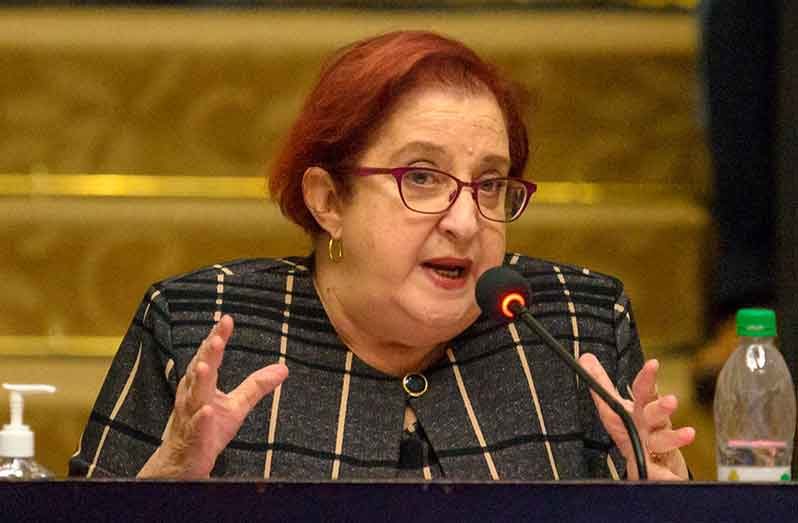–Minister Teixeira tells UN Human Rights Committee to consider ‘all’ civil society views
–says interventions of ‘leaving no one behind’ is a reality the government is striving for in all sectors
GIVEN the vast number of civil society organisations active in Guyana, the Minister of Parliamentary Affairs and Governance, Gail Teixeira expressed concern over what she described as the “tyranny of the minority,” given the focus on the positions of a few “well financed” NGOs by the Human Rights Committee of the United Nations.
“We don’t want to see the 21st century Jacobinism where those who shout the loudest, and those savvy on social media, are the ones who determine the fate of any country or any issue that is being dealt with.
“This will lead to the dismantling of democracy. We have fought too long to build it and therefore we accept that we haven’t reached where we want to go yet, that there are many challenges – but we are a small developing country with less than 800,000 people,” the minister said.
Her comment came on Wednesday, during the final day of the review of Guyana’s International Covenant on Civil and Political Rights (ICCPR) report, by the Human Rights Committee, under the auspices of the United Nations Commission on Human Rights (UNCHR) at its 140th Session, which was held in Geneva, Switzerland, this week.
Guyana was asked in 2020 to submit its third International Covenant on Civil and Political Rights report and the report was submitted in 2021.
Minister Teixeira said: “Democracy and freedom of expression, the right to freely express your views, is not isolated to one group of people. Every citizen, and the government, and the opposition – everyone – has a right to express their views – political views, criticism, etc. But it cannot be a situation where a small group of people seem to be wielding tyranny of the minority, who believe that they alone are the conscience of Guyana – regardless what the government says; regardless of what any other NGO says.
“Any NGO that does not agree with them then gets labelled as pro-government which is unfair to them. So, we want to build a democratic nation, but we don’t want anarchy. We will not allow anarchy because what would have been called gossip years ago has now become – thanks to the social media and different websites – it has become now, fact.
“And so we are not referring to anything particular, any committee member said, but the national stakeholders of Guyana and the civil society organisations are hundreds of organisations – not three or four, not five.
There are many more that play a valuable role in societies, whether it is through charities or their work with children…they are important too. Their views are important too.”
During the session which began on March 18, 2024 and concluded on March 20, 2024, Minister Teixeira pointed out that some of the questions asked by the committee members appeared to be “odd,” as they were either outside the mandate of the committee or about ongoing process before other UN agencies.
“We find this a rather odd question that the committee would ask us regarding an appointment of a person that’s appointed by a statutory board…we found it strange,” Minister Teixeira remarked, whilst responding to a question asked about the legal appointment of the Executive Director of the Environmental Protection Agency.
The minister added: “…we accept and have always accepted the Treaty bodies and reviewing, but it is difficult. I find it difficult to be asked here to answer on an issue regarding IACHR and Isseneru when as far as I know we have not concluded the process with IACHR on the Isseneru issue, and so I am not even aware that certain documents are public or in the public realm. So, I cannot answer and will not answer on that.”
According to her, Guyana as a small, developing country, has made significant strides and is currently pursuing a transformational development agenda.
“We wish to reiterate what we have been saying here about the advances made in Guyana and the progress we have made in our country – that the interventions of leaving no one behind is a reality we are striving for in all the sectors, social sectors, etc.
“The transformation in our country, in its physical infrastructure, is to improve communication, access, and transportation and reduce the cost for people from various parts of the country and, of course, to enhance business and economic activities, jobs, etc. This is what is our responsibility,” the minister said.
The Human Rights Committee meets three times a year for sessions lasting three weeks at the United Nations Office in Geneva, Switzerland.



.jpg)









